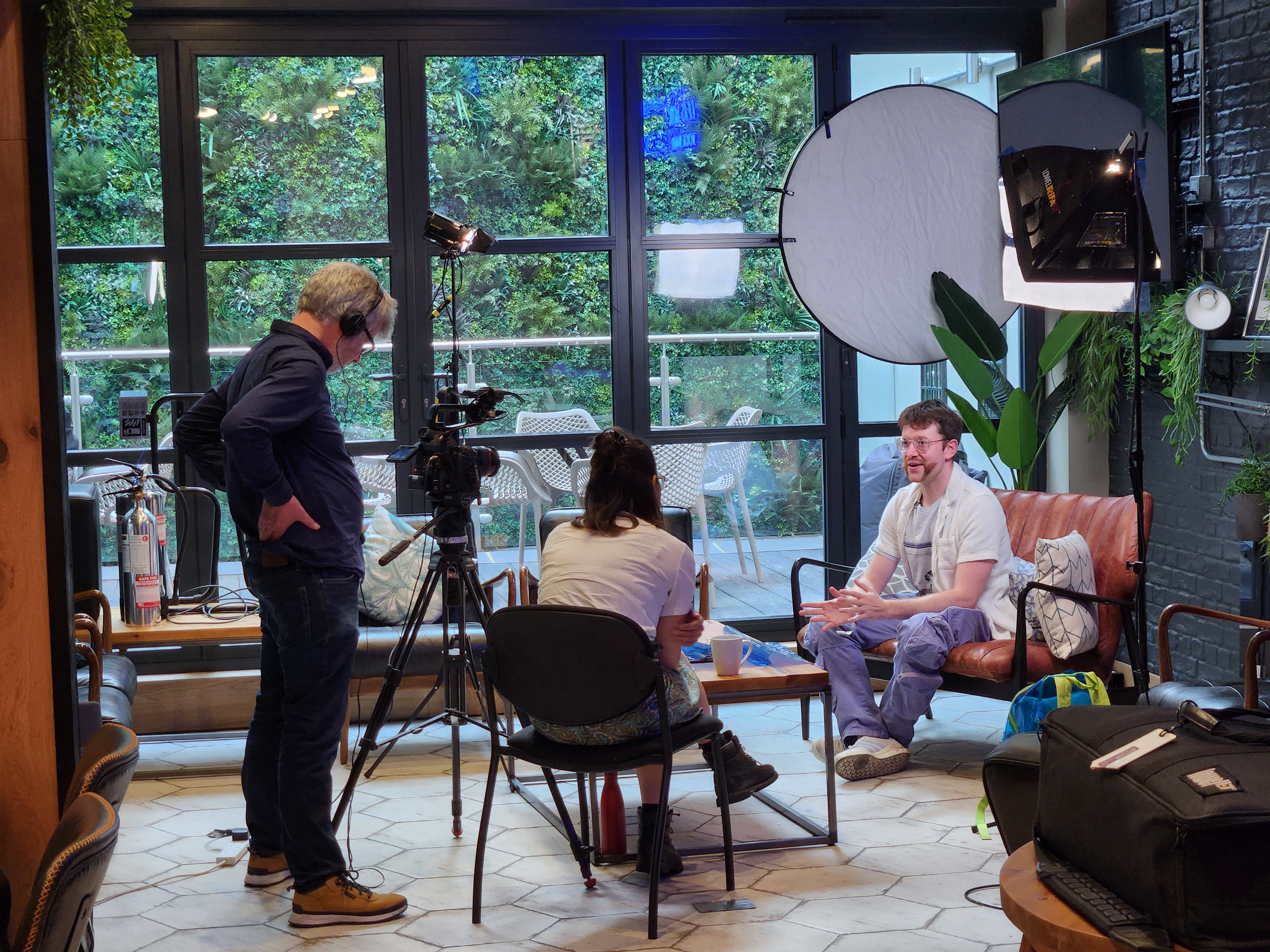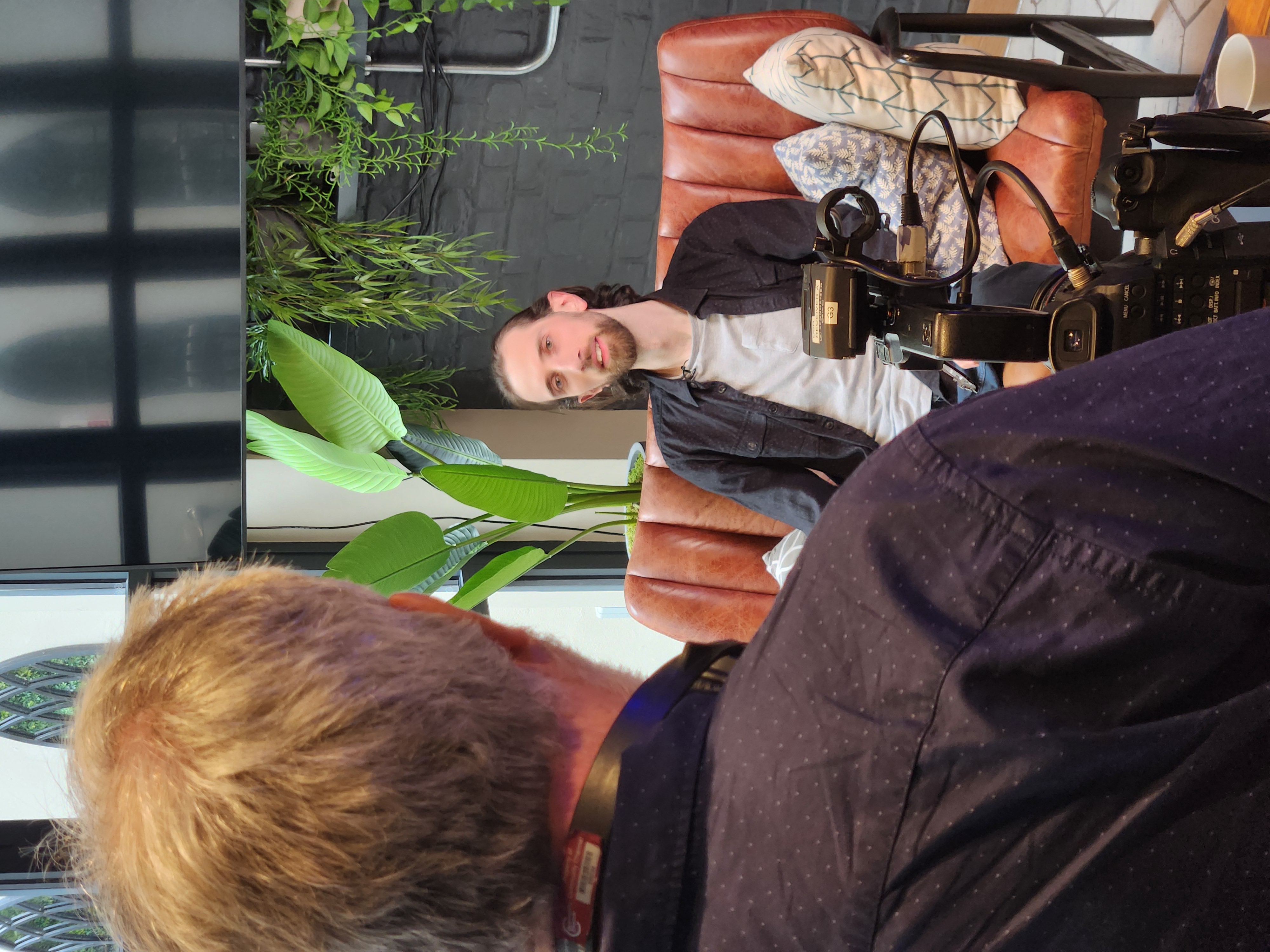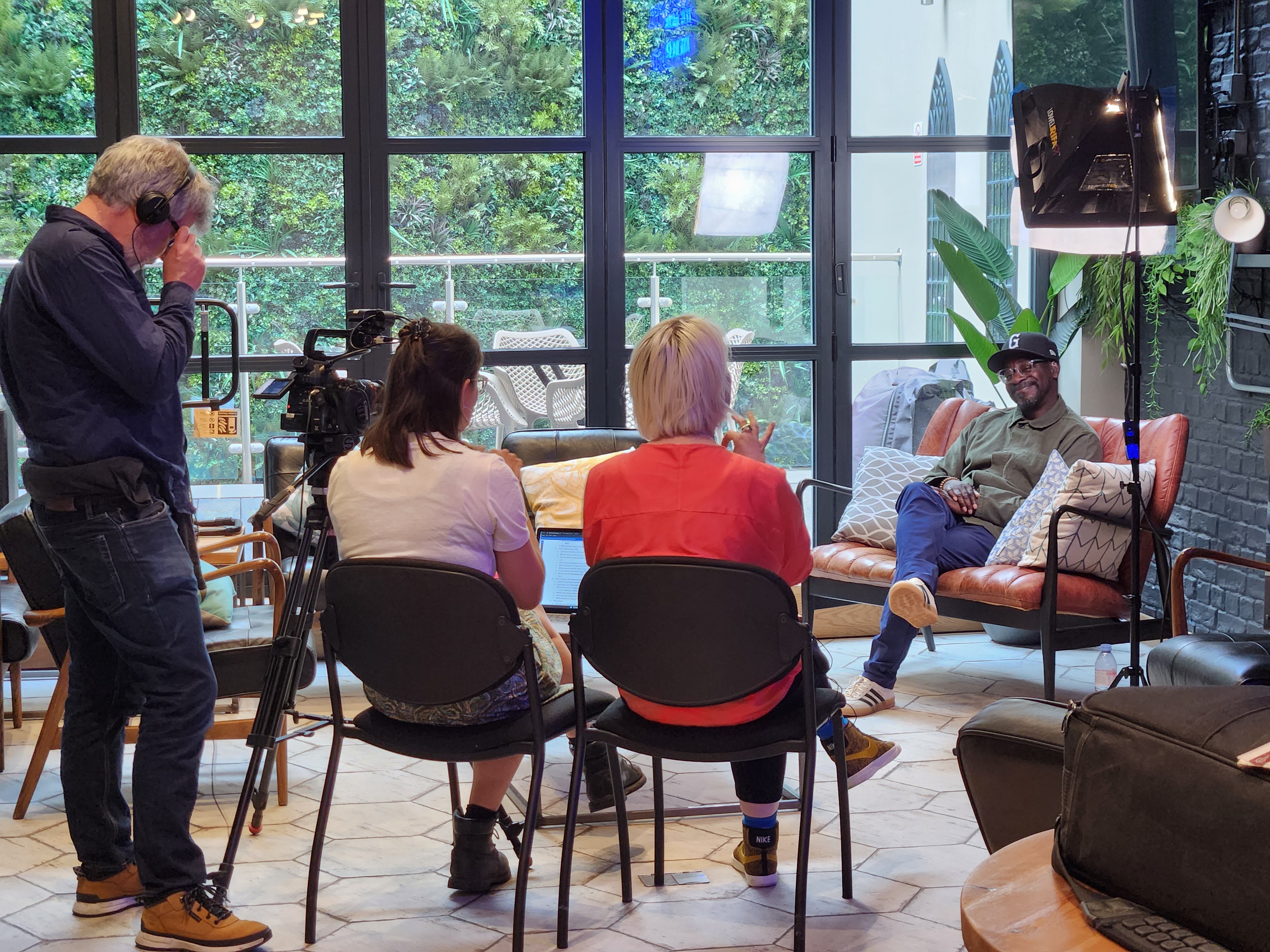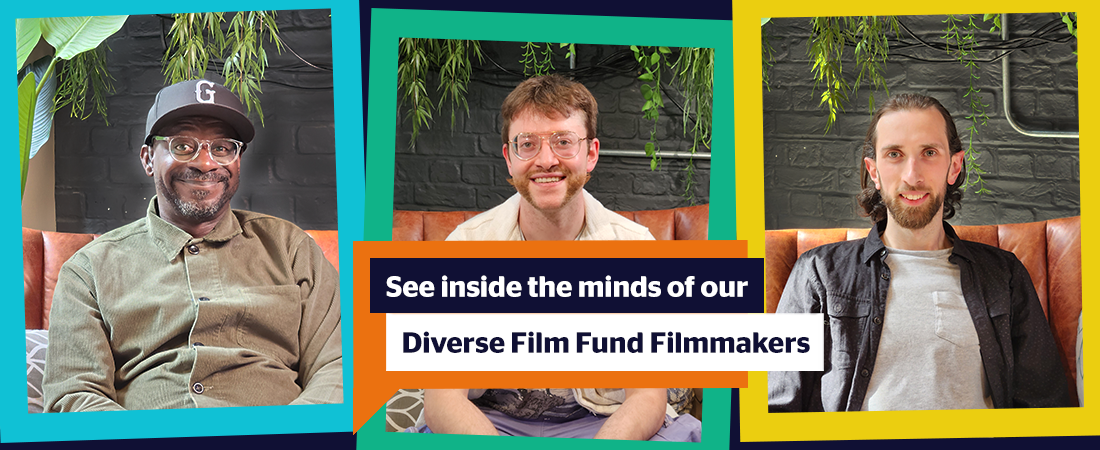Get a glimpse inside the minds of our 2024 Diverse Film Fund Filmmakers
Fresh from shooting their Diverse Film Fund short films, we caught up with the 2024 selected filmmakers for Together TV’s Diverse Film Fund. This year, the theme is deaf, disabled and/or neurodivergent lives today. Our three selected filmmakers Bim Ajadi, Stefan Pollak and Solomon Watkins will be bringing to life three short documentaries about stories close to their heart. We brought them together one sunny afternoon at The Film and TV Charity offices in leafy Golden Square to discuss their journeys so far:
What motivated you to become a filmmaker?
Solomon Watkins: I became a filmmaker because I used to be a sugar baby, I was dating a millionaire, and I spent so much time on long haul flights being really bored with nothing but films in front of me. I decided to start using that time to come up with ideas for films and write them. To support myself and do my own thing, I went to study film practice at London's Southbank University. When I first started trying to get into film it was quite hard. I looked at the sound department, and I remember I camped in a tent in London for 2 to 3 months so that I could save money on rent to buy sound equipment to get the ball rolling to work in film.
Stefan Pollak: Filmmaking goes hand-in-hand with my love for film, which goes all the way back to when I was younger. I’ve loved watching films throughout my whole life. Acting and doing drama back in primary and secondary school gave me a real understanding of the relationship and connection between a director and an actor. It gave me a newfound respect and knowledge of what goes into directing and making films. I studied filmmaking at college and at university, made some short films and haven't looked back!
Bim Ajadi: I started off as an editor working for in-house, post-production editing companies, mostly for music videos. I'm a little bit of an old school when it comes to music. I like R&B, soul, reggae…I love Motown!
One thing I really liked about music videos was I could cast actors and create a bit of drama and put narrative within the music video. I worked as an editor for more than 15 years, and I really became a director by accident. One day, a director on a shoot was ill and I was asked at the last minute to step in and direct a music video. When I was directing that, I started to really feel more of an interest in drama. That's what led to me moving into directing for film. And I've never looked back.
What has your experience been navigating the filmmaking world as a deaf, disabled or neurodivergent filmmaker?
Bim: I've been very lucky, to be honest. I've had good people who believe in me and really encourage me and nurture me. My journey has been really positive. There’s been a few times where I faced a few barriers, where I've encountered people that have had a bit of an attitude. But that's what's made me become who I am.
I'm very grateful for the doors that have been opened for me. And I'm excited when I have good collaborations with people. Some people have never worked with deaf people before and working with people who are willing to be open, listen and engage has really elevated me, and it's elevated my belief that there are good people out there who have all got similar goals. At the end of the day, we just want to make good films and do good storytelling.
There are two directors who have really inspired me. In my early days as a deaf director, there was a person called John Maidens. He's deaf himself. He's done very well in his career directing big programmes, such as EastEnders and Doctors. He's the one person that I look up to. He is somebody that's really encouraged me to get into the mainstream media world. The second director is somebody more recent called Luke Snelling. He's directed some of the episodes for Netflix’s One Day. I've been shadowing him recently on his new BBC drama called Reunion. He's great. I've never met a director like him who's shared their experiences and knowledge with me.
Stefan: I know people have a lot of preconceived sort of perceptions about disability and what people with disabilities can do and what they can achieve. Having that lived experience of disability, being a disabled filmmaker, I've encountered certain things too. I want to highlight and represent disability in a new light to change the perception on disability and the stigma around it.
Solomon: As a filmmaker, it's been pretty helpful because when you namedrop that in your application, if the person on the receiving end also has a neurodivergence you've got a link. There's a community aspect. I think when you watch the documentary that I've made, you'll see how you can build a community of people just solely based off having really thick glasses. It's little details like that, that being neurodiverse falls into as well. It's a lot more common but it still has a community aspect where you can make ties to help you move into other places with an understanding.
What project are you most proud of?
Solomon: The project that I'm most proud of today is a documentary-style music video “Waiting for You” by “Sofia Gillani”. It utilises a lot of the footage that we made in my final university research project. We combined eye tissue with camera lenses to try and replicate how out-of-focus lights look for people with high myopia and other eye conditions such as retinal detachment courtesy of students from Western Eye Hospital. Working in film, being able to see things out of focus all the time, instantly gives you, ironically, a really different view of the world.
Stefan: To be honest, I'd say this is probably my proudest project to date. The crew that I got the chance to work with was brilliant. A lot of them were very knowledgeable and experienced, so, getting to learn new things from them on set was great. Also, just being able to tell this story and get to know the family and the individuals involved.
What was your motivation behind making this film?
Bim: I met Jazzy Whipps last year on a different job I was directing on. She told me about her life as I'd never met a deaf social media influencer before. One of the sadder parts of her story was about trolling. She was on a high after making a viral video with over 6 million views. She'd been approached for jobs from various people and brands. Everything seemed great. Then on her 21st birthday, she saw a meme that had been created mocking her deaf voice. There were practically 1 million horrible comments made towards her. She had some really negative thoughts and it made her feel like she wanted to give up. Since then, Jazzy overcame this negative experience, raised up and kept going.
I didn’t initially think about making her life story into a film. But, I was having a conversation with one of my friends in a taxi, and we agreed that that voice and story needed to be told. It really stuck in my head, but at the time I didn’t take it any further. So, when I saw the call out for Together TV’s Film Fund, I thought that it was an inspirational story. That's why I came here and pitched it.
Solomon: I wanted to make this documentary because if you go into any opticians, you won't see a single model in any of their advertising where you can see facial inset or lens distortion in the glasses. I'm sure there are loads of film and photography excuses as to why it's easier to just do it without the glass. But I don't think completely erasing the function of glasses as an aid for disability and just leaving the fashionable aspect is right.
Lens distortion has massively been swept under the rug by the optical industry and further afield as well. Even when you watch movies with short-sighted main characters, they do not have prescription glass in their image. All representation of people who are nearsighted, have lens distortion and the actual aspects where it is a disability aid has been completely erased. I wanted to do a documentary that really focused on that and showed people what high myopics really look like. Get the thick glass out there!
Stefan: I saw the brief for the Diverse Film Fund and I knew that I definitely wanted to apply for it because I have that lived experience of disability and I'm also really into sport. I watch a lot of it, especially football. I wanted to develop an idea that focused on an individual in sports, and maybe something that's sort of community based or grass roots. I came across Jay and spoke to him and his brother.
It's a very personal story. I can really relate to because I've encountered certain things that Jay will have encountered in his life too. Through Jay's story, his perseverance and determination, I wanted to represent disability in a new light and change the perception.
Was there a memorable moment from your shoot? 
Stefan: Towards the end in the evening on the second day of filming, we filmed an adaptive gym session. It was all the regular gym-goers with different varying disabilities and the energy in the gym was just so great. It was great seeing the trainer and owner of the gym Alt movement, Craig, instruct everybody. It was crazy at the time of filming moving in and amongst a mix of people with disabilities, able bodied people and the trainers. But it was really good. It felt really uplifting. I’d definitely say that was one of the memorable moments.
Solomon: The space we filmed in is just an incredible collection of absolutely everything. It's like your typical London apartment. It's not huge, but every last centimetre of wall is just shelving with DVDs, videos and collections of everything. It's the most organized space I've ever been in.
Bim: Jazzy has got these two lovely pug dogs, and we filmed a scene with her walking her dogs on the beach. The crew were all going crazy over these dogs. It was hard trying to get them back to work and focus on the film, but they kept being distracted by the dogs. I am a dog lover, but usually bigger dogs. Sorry Jazzy!
What key takeaway would you want the audience to have after watching your film?
Stefan: The main thing would be the importance of family and support, and also the importance of inclusion and accessibility in sport within gyms, schools and society in general. There's a lot of different adaptive sports that are being highlighted now and given more coverage especially with the Paralympics. So, accessibility and inclusion, are the big themes in Alt-Jay.
Bim: I want the audience to appreciate Jazzy's life and the hard work within the social media arena as an influencer. You think it's a very glamorous, positive lifestyle. But actually, I want them to see beyond that, that there's more to it and I want the audience to appreciate what Jazzy is doing and realise it's not easy as people make it out to be.
Solomon: If this film can reach even just one person who has a really high glasses prescription, who never sees it anywhere in their day-to-day life but on themselves, hasn't ever met anybody with a high glasses prescription and they maybe feel down about it. If it can reach even just one person, who is that person I've just described, then that's fantastic. They might take some pleasure in watching this documentary.
But I think the story is applicable across multiple, different scenarios and disabilities as well. I think people will learn or see that there are more groups online where you can make connections as well. Do not always look at these things as something that isn't fashionable because there will be people who love what you've got and what you've got helping you as well.
Bim, Stefan and Solomon’s Diverse Film Fund films will be premiered on Together TV in September 2024. Keep an eye on our Instagram for sneak previews and more. You can stream previous Diverse Film Fund documentaries including 2022's Queer Lives Today films and the 2021 Black, British and Breaking Boundaries including the BAFTA winning Our Land on the Together TV streaming service.




























